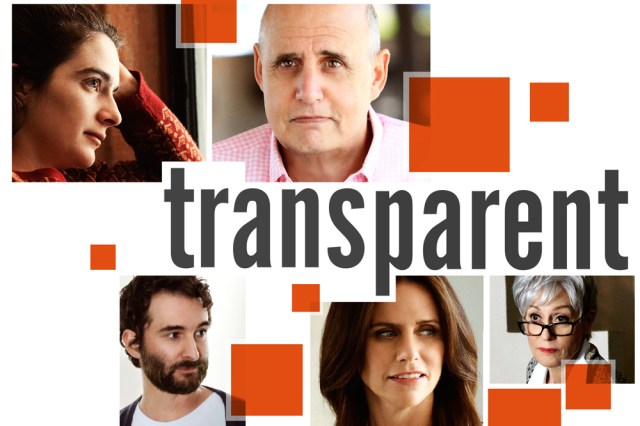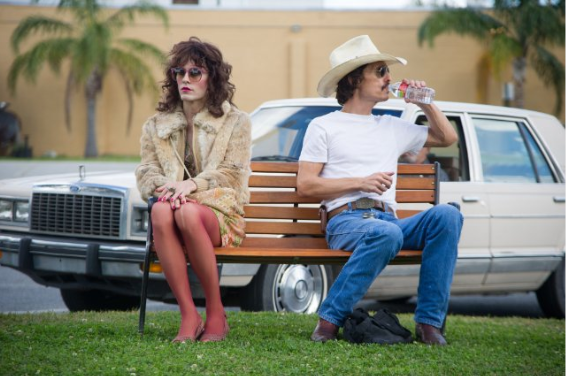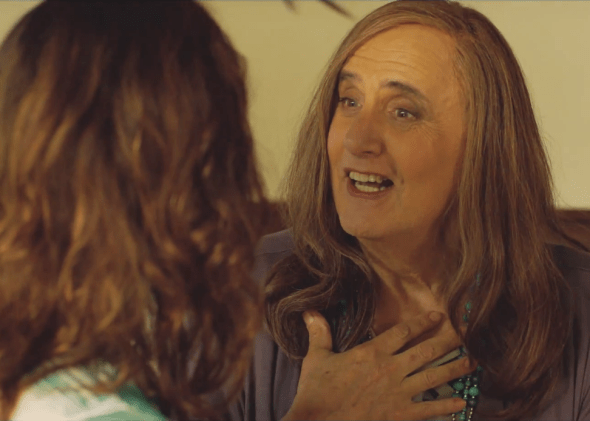Being a trans woman is complicated. It can seem like every day you have to deal with things that are anything but black and white. There’s the media’s portrayal of trans people, terminology, the entire concept of “passing” — and that’s just scratching the surface. Luckily, you have Mari and Mey to talk out their conflicted feelings on these things. Today, we’re going to talk about our conflicted feelings regarding the upcoming Amazon Prime show Transparent, which focuses on a trans woman who comes out to her adult family and how her family deals with that and with life. (Previously, Autostraddle has written enthusiastically about the pilot.) We watched the preview and talked things out.
Mey: I guess the first thing we should probably talk about is Jeffrey Tambor, a presumably cis man, playing a trans woman. Obviously cis men playing trans women has been a huge topic of public conversation over the last year (and longer within trans circles) and so the decision to cast a cis person is a strange one.
Mari: Considering how difficult it is for trans performers to get work, it really bothers me that the central character of a series billed by so many as “groundbreaking” is being played a cis person. Especially seeing how much acclaim cis performers seem to get for playing trans characters. See Jared Leto in Dallas Buyer’s Club and Felicity Huffman in Transamerica.
Mey: Yeah, I totally agree. It’s a weird thing seeing people being called “brave” and “groundbreaking” and “amazing” for pretending to be trans on screen for a few months. And then they get paid and awarded for it, and that makes it even stranger. So that did really rub me the wrong way.
Mari: Oh, to add to that list… forgot about Jaye Davidson in The Crying Game. (And these are just people who were nominated for or won Academy Awards for playing trans characters.)
There are arguments to made, of course, about the need to have big names attached to a project for it to gain attention. But, considering they have Jill Soloway directing, that’s already one big name. And, to me, it seems like casting bigger names in the support characters (as the series seems to be designed as more of an ensemble cast), and casting a trans actress as the trans character would have been a much better way to go.

Mey: Exactly. With people like Jay Duplass and Gaby Hoffman, who are playing two of her kids, who are sort of hip, rising stars, and then people like Rob Huebel and Carrie Brownstein in supporting roles, it seems like they do have a strong supporting cast that has several recognizable names.
But I think that the other thing they were going for, was that they wanted someone who fit their idea of what a late-transitioning trans woman looked like. Like, I think that they wanted people to be able to recognize the character as “having been a man up until now,” you know? Which obviously, that is super messed up within itself and there are actual trans actresses who look all sorts of ways and are all sorts of ages. Or why couldn’t they take a trans actress and give her the “trans woman makeup” that they gave Felicity Huffman in Transamerica?
Mari: I was thinking about that, too. Since the character is supposed to be a relatively late-in-life transitioner, there may have been some concern about finding a trans actress willing to look they wanted the character to look. But, I’m really bothered by the idea that trans characters need to look a specific way to meet the cis public’s conception of what trans women look like.
I think that’s a pervasive problem with the way trans women are portrayed by the mainstream media. They’re all either like Rayon, or they’re someone stunningly gorgeous like Laverne Cox or Carmen Carrera. There’s never any middle ground of the average-to-pretty trans women who tend to make a large part of the trans population.

Mey: Yeah, and I feel like Hollywood needs to make all trans women characters have literal physical markers that their character is trans. They want us to be constantly aware that she’s a trans woman, not a “regular woman” like all the other characters (since there is only ever one trans woman). And they only know two ways to physically mark a character as trans, and those are to make them either seductive and beautiful trans women who look “too good to be true,” or women who are clearly supposed to fit into the “men in dresses” trope. And there are definitely plenty of trans women who fit into both those categories, and that’s cool, but like you said, there are plenty of us who are in between and we never seem to be portrayed at all.
Mari: Yes! Absolutely spot on! Like you pulled the thoughts out of my head!
Mey: Can I talk about another thing that bothered me about the trailer? Do we really need another TV show (or movie, for that matter) about an upper-middle class white family and how tough life is for them? I can just watch Parenthood, Modern Family, or movies like This is Where I Leave You, Rachel Getting Married or The Royal Tenenbaums to get the exact same thing. Couldn’t they have been working class, or people of color or something?
Especially because the majority of trans women are not upper-middle class white women. And trans women of color don’t get as much representation as we should, although that is changing with people like Cox, Carrera and Janet Mock being in the spotlight so much.

Mari: Yes, I think that’s huge. So much of the media portrayal of queer culture in general is about the upper-middle class white section of the community, like The L Word, Queer As Folk, Will and Grace, etc etc. It really gives the impression than being queer and/or trans is something only privileged white people get to be. I think that’s especially harmful considering the exponentially higher challenges faced by queer people of color and trans people of color.
As corollary to that, I kinda feel like this is a story that’s been covered, the story of a later-in-life transitioning woman who’s married with children. This is pretty close in a lot of ways to Transparent (the documentary) from 2005, books like Jenny Boylan’s memoirs, Helen Boyd’s She’s Not The Man I Married, and Kristen Beck’s Warrior Princess.
Mey: Yes! I’ve talked to Janet Mock about that, how later-in-life white trans women with families completely dominated the trans memoir and story landscape for a long time, and only now are we starting to see diversity in the stories we hear, so Transparent does seem like a step back in that way.
Mari: *nod* Even Sophia in OINTB plays into that to a certain degree. The saving grace there is that she’s not white, but it’s still post-marriage, post-children transitioning.
Can I comment on two inter-related gripes I have?
Mey: Yeah, definitely.
Mari: To start, do we NEED another transition story? Why is that the only thing we can ever talk about when it comes to trans people? There’s a cis fascination with the “transformation” aspect of our transitions, so all discussions, all news coverage, all fictional narratives about us written by cis people have to somehow cover our transitions and contain the “before and after” photos, or the need to use dead names. Why can’t we have a trans character who has completed transition, and that’s all we ever know them as? Why does a period of our lives that’s quite short in comparison to the the period of time we’re post-transition have to dominate all narratives about us?
Intersected with that, why does the focus need to be on how this character’s transition affects everyone around her? It’s not about her and her journey and struggles. It’s about her family’s struggles WITH her and how something very important that’s she’s clearly struggled with for decades affects THEM and their lives. Again, that problem is pretty consistent in other accounts that discuss transition. And when this happens, the trans character become a plot device instead of a person.
Any other negatives before we talk about some of the positives? I’ll let you go first on this one.
Mey: Well, as far as positives go, as much as I think it looks problematic and overdone and White and everything, it does look pretty good. Like, they know how to market the show to Queer Millenials. And so I like that they’re putting some effort into making a quality piece of TV (or internet TV) about a trans person (and some other queer women). Plus, this does look better than a lot of trans media. So I guess my first thing that I think looks positive about it is that it’s quality.
Mari: *nod* That’s what first struck me, too. The writing is clearly pretty decent, which I’d expect from a project helmed by Soloway. The trailer gives an indication that the cast performances, including Jeffrey Tambor (problematic as it may be) will be worth watching at least an episode or two. I also like that other queer story lines are included, including one daughter who is clearly not straight, and another who is (from some interviews with Soloway) struggling with her own gender identity.

Mey: Yeah, definitely. And can we talk about that last line of the preview? The one where Maura’s (Jeffrey Tambor’s character) daughter asks her if she’s going to be “dressing up like a lady all the time” and she laughs a little and says, “No, honey, all my life, my whole life, I’ve been dressing up like a man.” That really killed me. I went into the preview ready to roll my eyes, but when she said that line, I was literally crying. That’s maybe my favorite line of dialogue about being trans I’ve heard written by cis people.
Mari: OMG YES THAT LINE. That line was like a stab in the chest. I’m pretty sure I’ve said something similar, either in conversation or writing. It was the moment that gave me hope that SOMEONE involved in the writing of the show actually “gets it.” Especially after some of the earlier comments from other characters about it being a “kink” and such.
There WERE, thankfully, some trans consultants on the show, and one of the writers is genderqueer. I know that Jenny Boylan consulted on the character creation at one point. I think, even more importantly, some of the more… problematic consults who worked on pieces like Dallas Buyer’s Club weren’t involved.
Mey: Oh yeah, that “it’s his little private kink” line! I did roll my eyes at that. But also Kathryn Hahn is in that scene, and I love her, so that’s another cast member I like.
That’s good about the consultants, I hoped they had done that, but didn’t know for sure. I hadn’t heard that about one of the writers, but that’s also a good sign. And yeah, that does make me feel better about which consultants weren’t used.
Mari: Another fact about the productions that made me feel a little better was the fact that Soloway put very specific efforts into making the set and crew very trans inclusive. According to her interview in the New York Times, they had 20 trans cast and crew and at least 60 trans extras.
Mey: Oh wow, that is good. So how about we wrap this up?
Mari: Sure. Final thoughts. You want to go first?
Mey: Sure. So, like we’ve said, this does look like it treads a lot of way-too-familiar ground. I’d much rather see fresh stories about trans women who aren’t necessarily well-off, white and with already established families. I’d also like to see stories about trans women where it isn’t just about how their transition effects their family and friends. And I definitely wish that the main character was played by a trans woman. But, I do think that they are trying to do a fairly good job. I’d even like to think that if the casting decisions were made a year later, they might have cast a trans woman as the lead. And the writing definitely looks good. I’m planning on watching it and giving it maybe two or three chances to mess up before deciding if I quit or not.
Mari: I think the series has problems, and they’re the same problems we tend to see time and time again. I’m concerned that the series might end up being a little on the exploitative side. I’m not pleased that the main character is played by a cis man, and I think the series treads some pretty well-worn paths without breaking a ton of ground. But, I have a least a little hope that it might tread those paths BETTER than those that have come before. The writing and acting look promising, and Jill Soloway is fairly brilliant, so those things should help to elevate it to at least “watchable.” I’ll definitely be watching the first few episodes with a smudge of optimism that something good will come of this project.
Transparent premieres on Amazon Prime on September 26.







